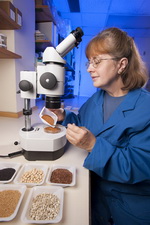
First Year Results of GM Camelina Field Trials Released
July 15, 2015| |
 Scientists at Rothamsted Research have announced the first year results of the field-scale trial of Camelina oilseed plants genetically engineered (GE) to make omega-3 fish oils in their seeds. The new data demonstrate an important proof of concept that a plant can be engineered to synthesize beneficial fatty acids in seeds, providing hope for sustainable land-based sources of omega-3 fish oils, and decreasing pressure from the oceans.
Scientists at Rothamsted Research have announced the first year results of the field-scale trial of Camelina oilseed plants genetically engineered (GE) to make omega-3 fish oils in their seeds. The new data demonstrate an important proof of concept that a plant can be engineered to synthesize beneficial fatty acids in seeds, providing hope for sustainable land-based sources of omega-3 fish oils, and decreasing pressure from the oceans.
Rothamsted scientists have successfully engineered Camelina sativa plants to produce non-native EPA and DHA, by introducing genes based on the DNA sequences found in photosynthetic marine organisms. Although previous experiments showed positive indications for the performance of this trait, the trial demonstrated its stability and the ability of the GM Camelina plants to synthesize useful quantities of fish oils without any negative effects on yield. The GM plants grown in the field did not show any phenotypic differences in the growth, flowering or seed-set when compared to the non-GM control plants.
For more information about the trials, read the news release at the Rothamsted Research website, or download the paper published in the journal Metabolic Engineering Communications.
| |
Biotech Updates is a weekly newsletter of ISAAA, a not-for-profit organization. It is distributed for free to over 22,000 subscribers worldwide to inform them about the key developments in biosciences, especially in biotechnology. Your support will help us in our mission to feed the world with knowledge. You can help by donating as little as $10.
-
See more articles:
-
News from Around the World
- BRAC Founder Hailed as 2015 World Food Prize Laureate
- Kenyan Farmers Call on the Gov't to Allow GM Products
- Bt Cotton Trials in Ghana Show Positive Results
- Genomics can Help Improve Sorghum's Resistance to Climate Stress
- First Stress Tolerant Soybean to Get Go-Ahead in Argentina
- CSIRO Scientists Develop Healthier Bread Wheat
- Biotech Cited for Food Diversity in PHL NAST Annual Scientific Meeting
- USDA FAS Releases GAIN Agri-biotech Report for Croatia
- First Year Results of GM Camelina Field Trials Released
-
Research Highlights
- Chinese Scientists Identify Molecular Mechanism Behind Grain Length of Rice
- IbMIPS1 Gene Enhances Salt and Drought Tolerance and Nematode Resistance in GM Sweet Potato
-
Beyond Crop Biotech
- Human Commensal Bacterium Successfully Modified
- FT-Overexpression Induces Early Flowering and Reproductive Development in Eucalyptus
-
Announcements
- 2nd International Conference on Agriculture, Biotechnology, Science and Engineering
-
Resources
- ISAAA Releases Beyond Promises: Top 10 Facts about Biotech/GM Crops in 2014
-
Read the latest: - Biotech Updates (February 18, 2026)
- Gene Editing Supplement (January 28, 2026)
- Gene Drive Supplement (February 22, 2023)
-
Subscribe to BU: - Share
- Tweet
